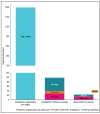Missed Opportunities: A Retrospective Study of Hepatitis C Testing in Hospital Inpatients
- PMID: 38932269
- PMCID: PMC11209528
- DOI: 10.3390/v16060979
Missed Opportunities: A Retrospective Study of Hepatitis C Testing in Hospital Inpatients
Abstract
Increasing testing is key to achieving hepatitis C elimination. This retrospective study aimed to assess the testing cascade of patients at a regional hospital in Victoria, Australia, who inject drugs or are living with hepatitis C, to identify missed opportunities for hepatitis C care. Adult hospital inpatients and emergency department (ED) attendees from 2018 to 2021 with indications for intravenous drug use (IDU) or hepatitis C on their discharge or ED summary were included. Data sources: hospital admissions, pathology, hospital pharmacy, and outpatients. We assessed progression through the testing cascade and performed logistic regression analysis for predictors of hepatitis C care, including testing and treatment. Of 79,923 adults admitted, 1345 (1.7%) had IDU-coded separations and 628 (0.8%) had hepatitis C-coded separations (N = 1892). Hepatitis C virus (HCV) status at the end of the study was unknown for 1569 (82.9%). ED admissions were associated with increased odds of not providing hepatitis C care (odds ratio 3.29, 95% confidence interval 2.42-4.48). More than 2% of inpatients at our hospital have an indication for testing, however, most are not being tested despite their hospital contact. As we work toward HCV elimination in our region, we need to incorporate testing and linkage strategies within hospital departments with a higher prevalence of people at risk of infection.
Keywords: cascade of care; hepatitis C; hepatitis C care; hepatitis C testing; hospitals; micro-elimination; people who use drugs; retention in care.
Conflict of interest statement
C.R. has received funding from Gilead Sciences and Deakin University that is not related to this study. A.J.W. has received funding from AbbVie and NHMRC that is not related to this study. J.S.D. has received funding from AbbVie and Gilead Sciences that is not related to this study. K.M.s institute has received funding from Gilead Sciences, ASHM and ViiV Healthcare that is not related to this study. There is no other conflict of interest to declare.
Figures


References
MeSH terms
LinkOut - more resources
Full Text Sources
Medical
Research Materials

